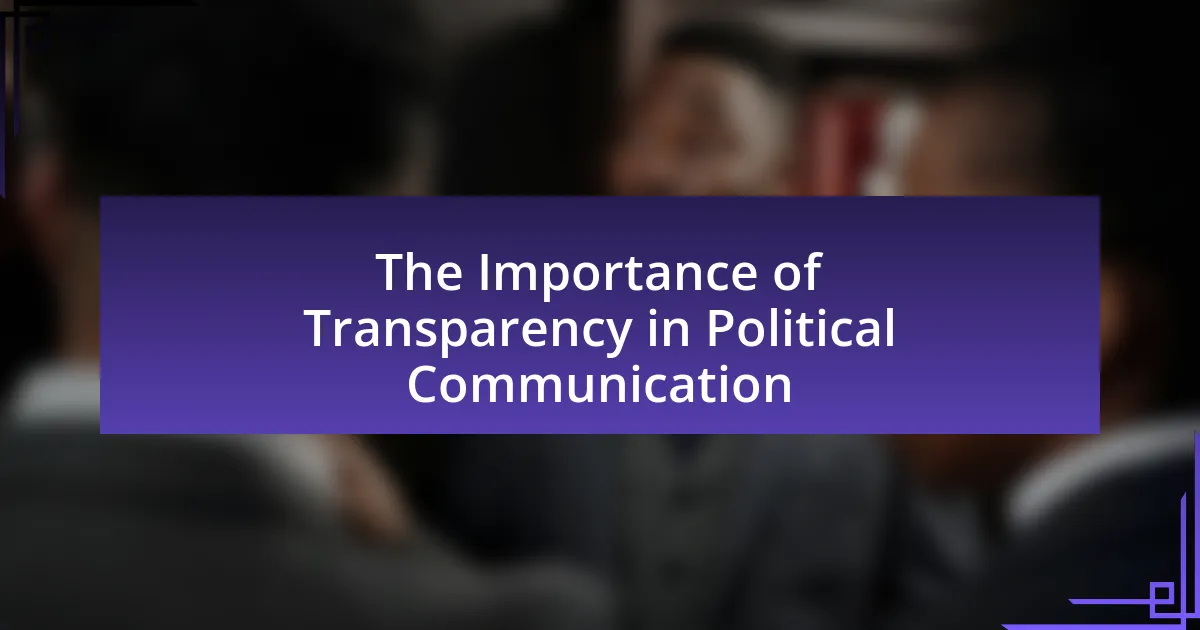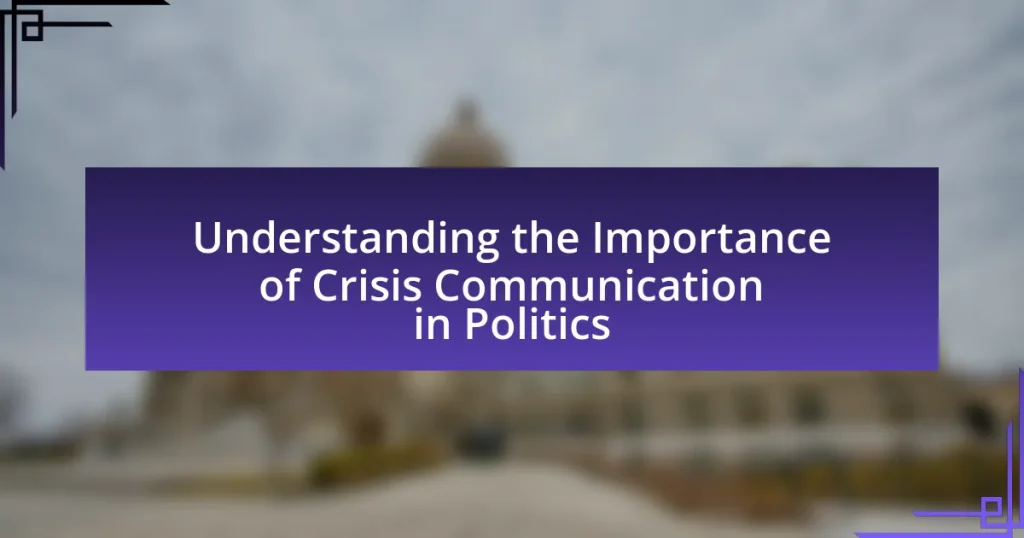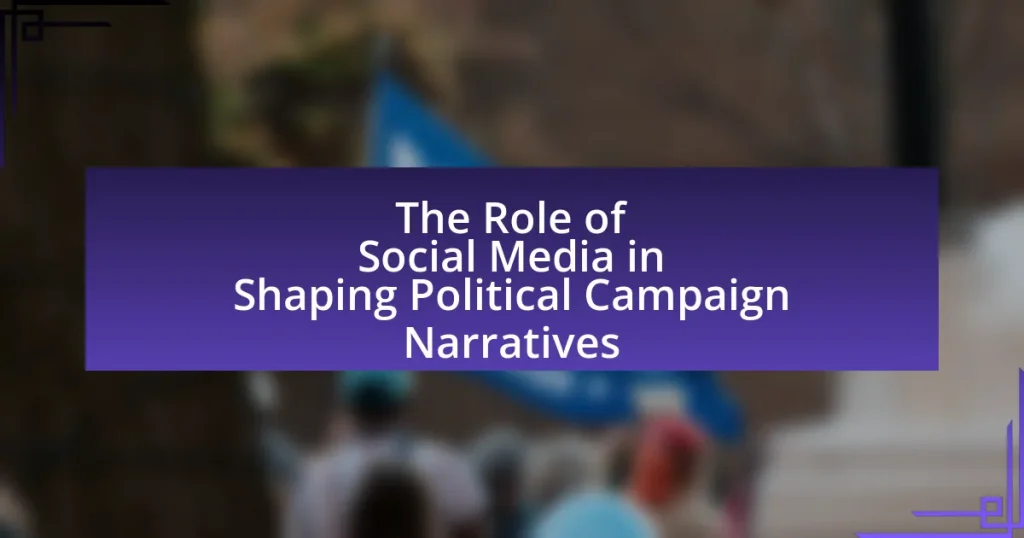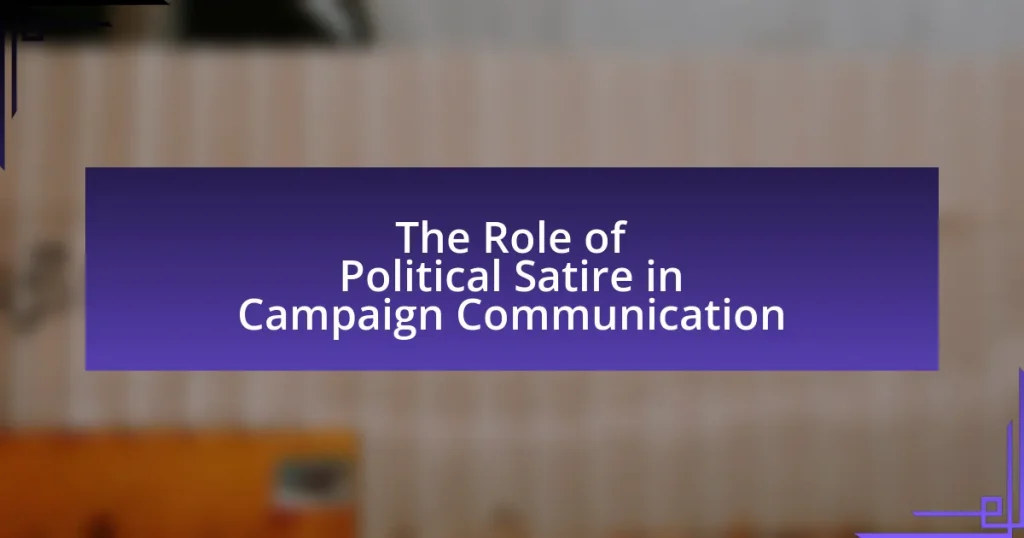The article focuses on the importance of transparency in political communication, emphasizing its role in fostering trust between governments and citizens. It outlines key principles such as openness, accountability, and accessibility, which are essential for informed public participation and engagement in the democratic process. The article also discusses the consequences of a lack of transparency, including decreased public trust and the proliferation of misinformation, while highlighting strategies for political entities to enhance transparency through clear communication and technology. Additionally, it addresses the challenges faced in promoting transparency and offers practical steps citizens can take to demand accountability from their leaders.
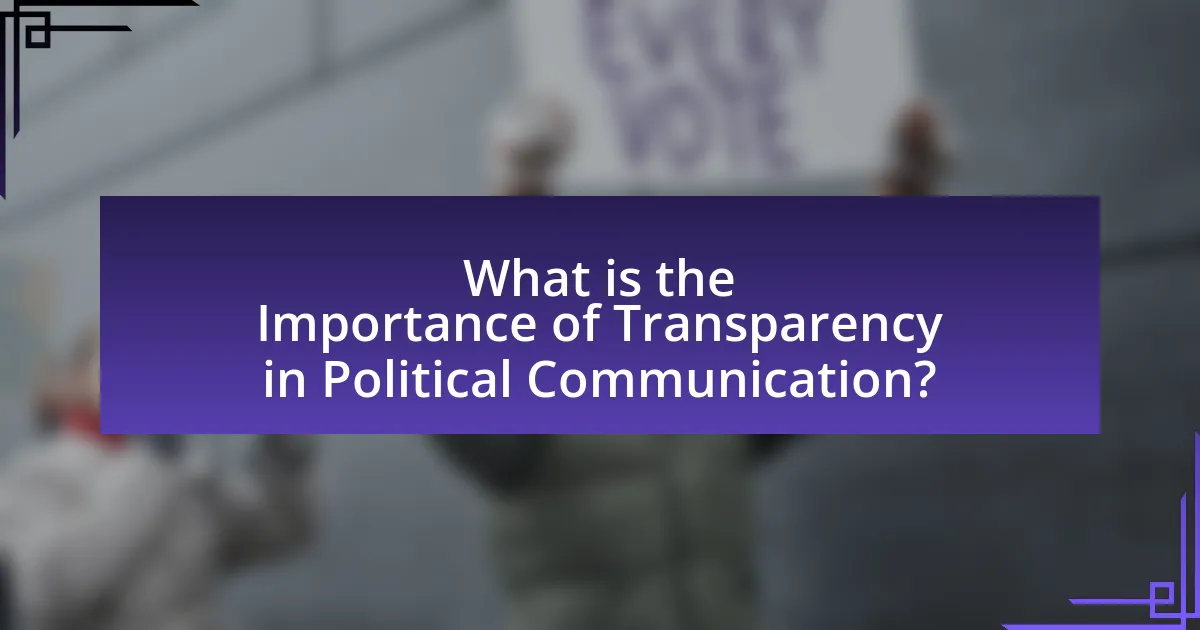
What is the Importance of Transparency in Political Communication?
Transparency in political communication is crucial as it fosters trust between the government and its citizens. When political entities openly share information, it enables the public to make informed decisions, enhances accountability, and reduces the potential for corruption. For instance, studies have shown that higher levels of transparency correlate with increased public trust in government institutions, as evidenced by the 2019 Transparency International report, which indicated that countries with transparent governance practices tend to have lower levels of perceived corruption. Thus, transparency serves as a foundational element for a healthy democratic process.
Why is transparency crucial in political communication?
Transparency is crucial in political communication because it fosters trust between the government and its citizens. When political entities openly share information about their actions, policies, and decision-making processes, it reduces misinformation and enhances accountability. For instance, studies have shown that transparent governance leads to higher public trust levels, as evidenced by the 2019 Edelman Trust Barometer, which indicated that 75% of respondents believe that transparency is essential for trust in government. This trust is vital for effective governance and civic engagement, as it encourages citizens to participate in the democratic process and hold leaders accountable.
What are the key principles of transparency in this context?
The key principles of transparency in the context of political communication include openness, accountability, and accessibility. Openness refers to the clear and honest sharing of information by political entities, ensuring that stakeholders are informed about decisions and actions. Accountability involves political leaders being answerable for their actions and decisions, fostering trust among the public. Accessibility ensures that information is readily available and understandable to all citizens, enabling informed participation in the political process. These principles are essential for building trust and fostering an informed electorate, as evidenced by studies showing that transparency in government leads to increased public trust and engagement.
How does transparency influence public trust in political entities?
Transparency significantly enhances public trust in political entities by fostering accountability and openness. When political entities provide clear and accessible information about their actions, decisions, and policies, it reduces uncertainty and suspicion among the public. Research indicates that higher levels of transparency correlate with increased public confidence; for instance, a study by the Pew Research Center found that 70% of Americans believe that transparency in government leads to greater trust in political leaders. This relationship is further supported by the fact that transparent practices, such as open meetings and public disclosures, allow citizens to engage more meaningfully with their representatives, thereby reinforcing trust.
How does transparency affect political engagement?
Transparency enhances political engagement by fostering trust between citizens and their government. When political processes and decisions are open and accessible, individuals are more likely to participate in civic activities, such as voting and public discourse. Research indicates that higher levels of transparency correlate with increased voter turnout; for instance, a study by the World Bank found that countries with transparent governance practices experience a 20% increase in electoral participation. This relationship underscores the critical role transparency plays in motivating citizens to engage actively in the political landscape.
What role does transparency play in voter participation?
Transparency significantly enhances voter participation by fostering trust in the electoral process. When voters perceive that information about candidates, policies, and voting procedures is openly shared and accessible, they are more likely to engage in the electoral system. Research indicates that transparency reduces feelings of disenfranchisement and skepticism, which can lead to higher turnout rates. For instance, a study by the Pew Research Center found that 70% of voters believe that transparency in campaign financing influences their likelihood to vote. This correlation underscores the critical role transparency plays in motivating citizens to participate actively in elections.
How can transparency enhance civic responsibility among citizens?
Transparency enhances civic responsibility among citizens by fostering trust and accountability in governance. When citizens have access to clear and accurate information about government actions and decisions, they are more likely to engage in civic activities, such as voting and community involvement. Research indicates that transparency leads to increased public participation; for instance, a study by the World Bank found that transparent governance correlates with higher levels of citizen engagement and satisfaction with public services. This engagement is crucial for a functioning democracy, as informed citizens are better equipped to hold their leaders accountable and advocate for their rights and interests.
What are the consequences of a lack of transparency in political communication?
A lack of transparency in political communication leads to decreased public trust in government institutions. When citizens perceive that information is being withheld or manipulated, they become skeptical of political motives and decisions, which can result in lower voter turnout and increased political apathy. For instance, a 2019 study by the Pew Research Center found that 71% of Americans believe that government officials do not always tell the truth, indicating a significant trust deficit. This erosion of trust can also foster the spread of misinformation, as individuals may turn to alternative sources for information, further complicating the political landscape.
How does misinformation thrive in opaque political environments?
Misinformation thrives in opaque political environments due to the lack of accountability and transparency, which creates fertile ground for false narratives to spread unchecked. In such environments, citizens often have limited access to reliable information, making them more susceptible to believing and sharing misleading content. For instance, a study by the Pew Research Center found that 64% of Americans believe that misinformation causes confusion about basic facts, particularly in politically charged contexts. This confusion is exacerbated when political leaders or institutions do not provide clear, accurate information, allowing misinformation to fill the void.
What are the potential risks to democracy from non-transparent practices?
Non-transparent practices pose significant risks to democracy by undermining accountability and eroding public trust. When political processes lack transparency, citizens cannot effectively scrutinize government actions, leading to potential abuses of power and corruption. For instance, a study by the International Institute for Democracy and Electoral Assistance found that countries with higher levels of transparency in governance experience lower levels of corruption and greater citizen engagement. Additionally, non-transparent practices can facilitate the spread of misinformation, as citizens may rely on unverified sources, further polarizing public opinion and destabilizing democratic institutions.
How can political entities improve transparency in their communication?
Political entities can improve transparency in their communication by adopting clear, consistent messaging and utilizing accessible platforms for information dissemination. Clear messaging involves using straightforward language that avoids jargon, ensuring that the public can easily understand policies and decisions. Consistency in messaging reinforces trust, as it demonstrates reliability and accountability. Utilizing accessible platforms, such as social media and official websites, allows for real-time updates and direct engagement with constituents. According to a 2020 study by the Pew Research Center, 69% of Americans believe that social media is an important tool for political communication, highlighting its role in enhancing transparency.
What strategies can be implemented to foster transparency?
To foster transparency in political communication, implementing regular public disclosures of information is essential. This strategy ensures that citizens have access to relevant data regarding government actions, decisions, and expenditures. For instance, the Open Government Partnership, which includes over 75 countries, promotes commitments to transparency through initiatives like proactive publication of government data and citizen engagement in policy-making processes. Such measures have been shown to enhance public trust and accountability, as evidenced by studies indicating that transparency initiatives can lead to increased citizen participation and improved governance outcomes.
How can technology be leveraged to enhance transparency in political communication?
Technology can be leveraged to enhance transparency in political communication by utilizing digital platforms for real-time information dissemination and data analytics to track political promises and actions. For instance, social media allows politicians to communicate directly with constituents, providing immediate updates and fostering open dialogue. Additionally, blockchain technology can be employed to create immutable records of political transactions and campaign financing, ensuring accountability. Research from the Pew Research Center indicates that 69% of Americans believe social media helps them stay informed about political issues, demonstrating its role in promoting transparency. Furthermore, data visualization tools can present complex political data in an accessible manner, enabling citizens to better understand government actions and policies.
What are the best practices for ensuring transparency in political communication?
The best practices for ensuring transparency in political communication include clear messaging, open access to information, and accountability mechanisms. Clear messaging involves using straightforward language that avoids jargon, making it easier for the public to understand political positions and policies. Open access to information requires governments and political entities to provide timely and comprehensive data about their actions, decisions, and funding sources, which fosters trust and informed public discourse. Accountability mechanisms, such as regular audits and public reporting, ensure that political actors are held responsible for their communications and actions. These practices are supported by studies indicating that transparency enhances public trust and engagement in the political process, as evidenced by research from the Transparency International Global Corruption Barometer, which shows a correlation between transparency and citizen trust in government.
What guidelines should political leaders follow to maintain transparency?
Political leaders should adhere to guidelines that promote openness, accountability, and clear communication to maintain transparency. These guidelines include regularly disclosing information about decision-making processes, financial dealings, and policy impacts to the public. For instance, the Open Government Partnership, which includes over 75 countries, emphasizes the importance of accessible information and public participation in governance. Additionally, leaders should establish mechanisms for public feedback and ensure that communication is straightforward and devoid of jargon, thereby fostering trust and engagement among constituents.
How can organizations measure the effectiveness of their transparency efforts?
Organizations can measure the effectiveness of their transparency efforts through surveys, stakeholder feedback, and performance metrics. Surveys can assess public perception and trust levels, while stakeholder feedback provides qualitative insights into the impact of transparency initiatives. Performance metrics, such as the frequency of information disclosures and engagement rates with transparency-related content, offer quantitative data to evaluate success. For instance, a study by the Transparency International found that organizations with higher transparency ratings experienced a 20% increase in public trust, demonstrating a direct correlation between transparency efforts and stakeholder confidence.
What are the challenges to achieving transparency in political communication?
Achieving transparency in political communication faces several challenges, including misinformation, lack of access to information, and the complexity of political language. Misinformation can distort public perception and undermine trust, as seen in various electoral processes where false narratives spread rapidly through social media. Additionally, the lack of access to accurate and timely information can hinder citizens’ ability to make informed decisions, exemplified by the limited availability of government data in certain regions. Lastly, the complexity of political language often alienates the public, making it difficult for individuals to engage with political discourse effectively. These factors collectively impede the goal of transparency in political communication.
What obstacles do political entities face in promoting transparency?
Political entities face several obstacles in promoting transparency, including bureaucratic resistance, lack of public trust, and the potential for political backlash. Bureaucratic resistance often stems from entrenched interests within government institutions that may prefer to maintain the status quo rather than disclose information. Additionally, a lack of public trust can hinder transparency efforts, as citizens may be skeptical of the motives behind disclosures, fearing manipulation or incomplete information. Political backlash is another significant obstacle, as revealing certain information may provoke criticism or opposition from rival political factions, leading to a reluctance to share data that could be politically damaging. These factors collectively impede the ability of political entities to foster an environment of openness and accountability.
How can these challenges be overcome to enhance transparency?
Challenges in enhancing transparency can be overcome by implementing robust regulatory frameworks and utilizing technology for information dissemination. Regulatory frameworks, such as the Freedom of Information Act, mandate the disclosure of government information, thereby fostering accountability. Additionally, technology, including blockchain and open data platforms, can facilitate real-time access to information, ensuring that citizens are informed and engaged. For instance, a study by the Pew Research Center found that 70% of Americans believe that government transparency is essential for democracy, highlighting the public’s demand for accessible information.
What practical steps can citizens take to demand transparency from political leaders?
Citizens can demand transparency from political leaders by actively engaging in advocacy, utilizing public records requests, and participating in community forums. Advocacy efforts can include organizing or joining campaigns that promote transparency initiatives, such as lobbying for stronger open government laws. Public records requests allow citizens to access documents and information that political leaders are required to disclose, thereby holding them accountable. Additionally, participating in community forums enables citizens to ask questions directly and voice concerns regarding transparency issues, fostering a culture of openness. These actions are supported by various studies indicating that civic engagement and informed citizenry lead to greater accountability in governance.
